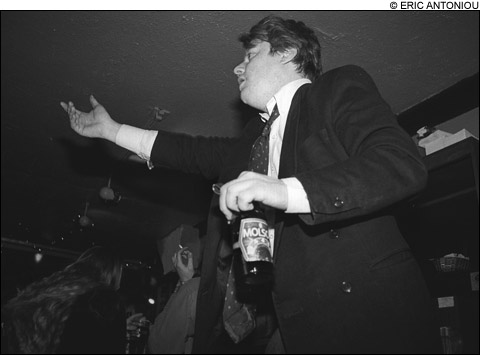
SENSATIONAL: Ruane consumed — and provoked — all manner of the arts, but especially music, with compulsive intensity. |

Billy Ruane died last week at the age of 52, leaving the Boston music scene in his debt: people who met rock heroes in Ruane's living room, fans who went to an unforgettable show because he badgered them into coming, and — the largest list of all — musicians who got a gig, financial support, or encouraging words from Ruane when they most needed it. They all had stories to tell about his larger-than-life eccentricity, harsh wet kisses, and hours-long phone calls. But the one word that keeps popping up is "generosity." And behind that word is another Billy Ruane. Not just a colorful character, or a cheerleader for the Boston music scene, but a player who — almost in spite of himself — actually helped shape that scene in crucial ways. A tribute at Boston's Fourth Wall Project that went up days after Ruane's death featured a giant black-and-white spraypainted likeness of Billy, hair tousled, looking at the viewer with that faint, sad smile. The legend read: "Billy Ruane: Godfather of Boston Rock 'N Roll." On first impression, that might read as an overstatement. But more and more, in retrospect, it reads as truth.
If one thing's become clear, it's that large sectors of the past and present Boston scene take this loss very personally. Ruane's been a defining spirit on the local scene. He'd show up at select gigs and make his whirlwind energy felt — by doing that dance of his ("You could always tell a band's radio hit when Billy's gyrations got wilder," close friend Mary Lou Lord says), by distributing a few rounds of beer, or buying up and giving away the band's entire merch table — and leave a half-hour later. Ruane was bipolar, and his attempts to medicate that condition — sometimes prescribed, sometimes otherwise — produced drastically mixed results over the years, including a long disappearance from the scene during the '90s. His sudden death was apparently the result of pharmaceutical drugs and blood-pressure meds coupled with a heart condition. Earlier in the week, he'd left the hospital against medical advice, and Pat McGrath, his longtime friend and sometime guardian, was having a tougher and tougher time keeping tabs on him. "He was feeling a midlife crisis that made him push things even further than usual," says McGrath. "Just think of what happens when a manic person gets five times more manic."
Something spiritual
Born in New York City on November 10, 1957, Ruane was the eldest son of William J. Ruane, a wealthy Wall Street investment banker best known as a manager of the Sequoia Fund and patron of the arts. The junior Ruane attended the Cambridge School of Weston in the mid '70s, graduated from Harvard Extension School in 1986, and worked for a few years at the Widener Library. As a teen, at punk shows at the Rathskellar in Kenmore Square, Ruane discovered the Boston music scene. Neither would be the same again.